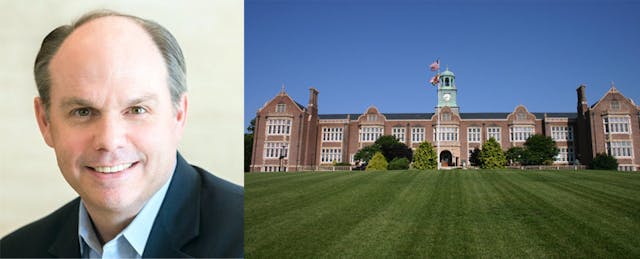Throughout the US, more than a dozen “incubators” are helping jump start fledgling education technology companies. That means that getting companies started has become the easy part. Now the road less travelled involves helping companies work with educators on a sustainable basis--to create solutions to real problems, and of course, to navigate the long, complex sales cycles inherent in the education system.
And who better to lead on the road less travelled than someone who has street cred with both educators and innovators?
On Oct. 8, Towson University, the institution that produces more teachers in Maryland than any other, announced that long-time venture capitalist Frank Bonsal has agreed to become director of entrepreneurship, and leader of the school’s business incubator, TowsonGlobal. Bonsal, notoriously modest with a wry sense of humor, has a long history of quietly mentoring and investing in young teacherpreneurs. In his new role at Towson, Bonsal will expand those he supports by infusing entrepreneurship across the university including helping faculty and students monetize their ideas. He wants to broaden who considers themselves to be entrepreneurial, including a call to long-time educators.
Bonsal has become something of a legend in edtech investing circles as he’s had a hand in financing more than 20 companies, including such big names as Blackboard and Moodle Rooms. But he earned his education street cred the old-fashioned way—by training and working as a teacher. At the University of New Hampshire, Bonsal studied English education and then continued to Vanderbilt for his master’s in elementary education with a middle school endorsement. Bonsal launched his career as many teachers do, first as a coach and then quickly becoming an English and history teacher. After nine years in the classroom, Bonsal jumped to the business side, returning to Vanderbilt to earn his MBA.
In addition to Blackboard and Moodle Rooms, Bonsal’s portfolio of companies through his work at New Markets Venture Partners is studded with familiar names: Questar Assessment, American Honors, Better Lesson, Think Through Math, and more recently, Kickboard and Calvert Education Services (which recently merged with Vschoolz). Bonsal Capital, a small family private equity firm, also recently funded Baltimore-based Allovue, a company that helps schools track and allocate resources more effectively.
Because of Bonsal’s deep expertise in edtech, many in the community have wondered if he would shape TowsonGlobal into an edtech incubator, narrowing its focus which has during the past six years included any kind of business, from food business (Keffa Coffee) to support for women-led business (MyCity4Her.com)
Bonsal’s short answer: No.
The long answer, however, is more complicated and intriguing. Bonsal aims to shift TowsonGlobal’s focus toward developing and supporting edtech entrepreneurship across the university and developing the larger education innovation ecosystem across Maryland. His approach will build on Towson’s 150-year old history as an institution for teachers as well as its reputation for offering quality programs on a Raman budget, a skill entrepreneurs readily appreciate. Bonsal believes that funds can more effectively be spent connecting and building upon existing structures, rather than creating another short term-incubation program. “We have the talent, the entrepreneurial expertise and the passion for education to make this successful,” champions Bonsal.
Cornerstones of TowsonGlobal’s education innovation hub, Bonsal expects, will include key people and groups already affiliated with Towson University: former State Superintendent Nancy Grasmick, now a residential scholar at the university; the newly created Office of Academic Innovation; and the Object Lab, headed by Jan Baum, nationally recognized as a leader in the Maker movement.
At the heart of TowsonGlobal, contends Bonsal, will be collaboration: He aims to weave edtech programming, mentors, and capital resources on top of the already close to 30 existing business incubators across Maryland. Essentially, TowsonGlobal will become the edtech coordinator for the network of Maryland business incubators, including the Emerging Technology Centers and the Maryland Center for Entrepreneurship, allowing edtech companies from across the state to take advantage of a constellation of relationships and resources while remaining part of existing incubators.
“Why recreate the wheel?” Bonsal says. “Collectively the existing incubators are the number five job producers in the state of Maryland, so they already make a significant economic impact.” Adding another competing incubator won’t help the ecosystem as much as offering support to all edtech companies across the state can.
Participating entrepreneurs receive access to TowsonGlobal’s facilities, mentors and other resources. Two of the 20 companies currently part of TowsonGlobal focus on edtech: Common Curriculum and Immersive 3D, Two more edtech companies will be announced soon, Bonsal suggests. Companies can also participate virtually.
Bonsal invites like-minded educators to join the ecosystem as participants, mentors and investor. Most important: “We’re looking for teacherpreneurs who share our vision.” We’ll be watching to see which educators and entrepreneurs answer the call!


